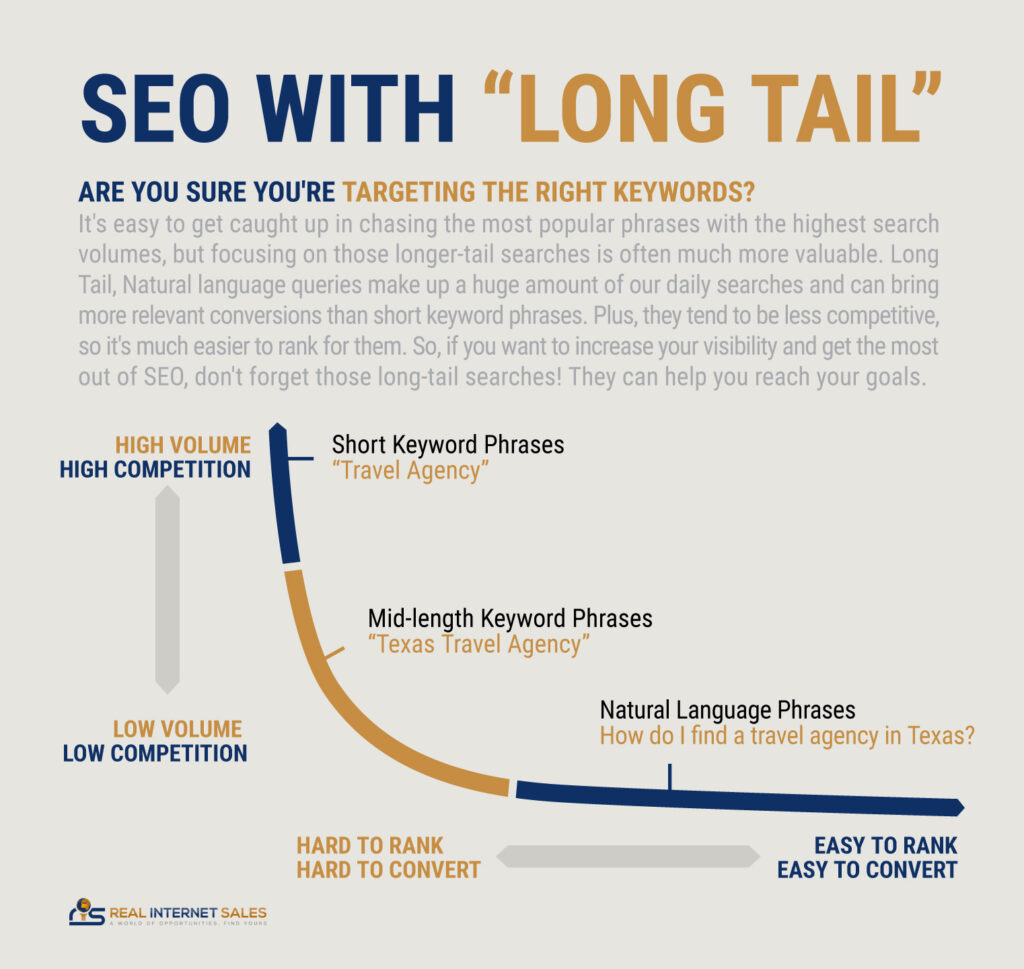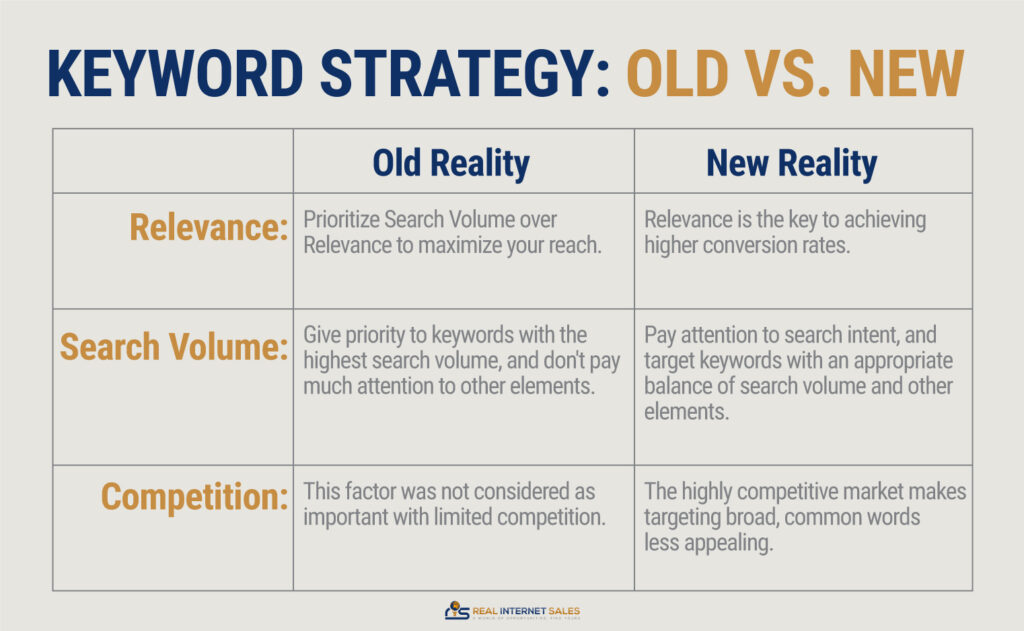If you’re ready to implement SEO or interested in it, you’re likely thinking about which keywords to target. You may have even identified a potential “game changer” keyword and thought, “If I could rank number one for that keyword, it would revolutionize my business.” Well, you are mistaken.
You may have heard “the customer is always right,” but that’s not always true regarding SEO. Many clients focus too much on rankings and not enough on getting actual conversions and leads. And to be honest, many SEO clients don’t know what keywords to focus on. To better understand why this is, let’s take a quick look at the history of SEO and keyword strategy.
Exploring the Evolution of Keyword Strategy Through Time
In the early days of the internet, the perfect keyword was built on three pillars:
1. Relevance
Are you tired of seeing your website rank well for keywords that don’t make sense for your business? It’s like trying to sell ice cream at a meat market. It just won’t work. And let’s be honest when someone stumbles upon your website looking for something you don’t even offer, they’re not going to stick around and think, “oh wow, maybe I should check this out.” No way, they’re going to hit that back button so fast your head will spin. Trust me, it’s time to focus on keywords that are actually relevant to your business. It’ll save you a lot of headaches in the long run.
2. Search Volume
Why waste your time ranking for a keyword that’s rarely searched? It’s much better to focus on keywords that have good search volume and are relevant to your business. Although it will take time to rank your website for these keywords, this ensures you get the most out of your SEO efforts.
3. Competitiveness
If you’re a travel agency looking to attract more clientele, your keywords must be less competitive.
To ensure this, conduct a simple Google search for keywords like “Travel Agency.” Next, check below the Google search box, you’ll see something similar to:
About 1,470,000,000 results (0.83 seconds)
For example, for the search term “Travel Agency,” the sheer magnitude of web pages Google returns is huge! To make it into that coveted top 3 position, where most traffic goes, you’re up against an ocean of competition, perhaps 100 million websites! You may be tempted to focus on a more specific term such as ‘Texas Travel agency instead. If that’s the route you’re leaning toward, think again. Doing SEO with outdated methods is still wrong and won’t get you very far.
Revolutionizing Keyword Strategy: The Forces Behind the Scenes
In the modern SEO keyword strategy, relevance, search volume, and competitiveness remain key, but with slight modifications. This is due to the Internet’s two major changes: expansion and users communicating in natural language when looking for what they need.
The December 2022 Netcraft Web Server Survey reveals that the total number of websites has skyrocketed from 90 million to a whopping 1,125,374,532 in 10 years. Although there are exponentially more web pages today than before, only one website remains at the top for any keyword search. Moreover, 10 years ago, SEO was a foreign language to many. But now, everyone is engaging with it, making digital marketing much more competitive.
Can you believe it? We live in a world where talking to our computers is a reality! We can thank services like Apple’s Siri and Google Now for making this possible. With desktop computer use staying the same and mobile use skyrocketing, people are using their voices to search instead of their fingertips. Android devices now let you say “Ok, Google” to start a search, and it looks like this feature will soon be available on Chromebooks too. Who would have thought that something we once only saw in sci-fi movies would become a part of our everyday lives?
Voice search is gaining traction, and people are using different keywords than before. Instead of searching for “Texas Travel Agency,” they might ask questions like “How do I find a travel agency in Texas to help me book a vacation?”. Longer keyword phrases are becoming increasingly popular as searchers prefer more natural language. While short, generic keywords still generate a lot of traffic; their use is gradually decreasing. You can see this in Google Trends for most short keywords.
The trend for searches for “Travel Agency” on Google.
The trend for searches for “ Texas Travel Agency” on Google.
Contrary to what some might think, the number of people searching for travel agencies has actually grown over the years. However, their search terms have evolved as well.
Where Should I Direct My Efforts for an Effective Keyword Strategy?
Have you been wondering where all of your searches have gone? The concept of “the long tail” can help us understand this current trend. First introduced by Chris Anderson in his Wired article and then further explored in an entire book. In short, a small set of keywords get searched for often (high volume) – these form the body. Then there are the keywords that get searched for less often (low volume) – these make up the long tail. It may surprise you, but when you add up all of the searches in the long tail, it could be bigger than the body! Here’s a picture to help explain what we mean:

When focusing on the long tail approach, it’s still important to consider how relevant your keywords are, how much they’re being searched for, and how competitive they are. However, the way you target search terms has changed. Rather than aiming for a few keywords that will get lots of traffic, you should focus on hundreds or thousands of phrases. Even if they each only bring in a few visitors, these more natural language-based terms are more relevant and thus convert better.
The old-school approach to keyword strategy was all about ranking high for generic terms like “travel agency.” But the new reality? It’s all about optimizing your website and content for long-tail search terms. Here’s why: a high ranking for a “travel agency” might get you a lot of traffic, but how much of that will turn into leads? Probably not a lot since many of those searchers may be looking for a firm outside of Texas or for a job at a travel agency rather than to hire one. That’s why it pays off to rank well for more specific long-tail search terms, like “How do I find a travel agency in Texas to help me book a vacation.” You may not get as much traffic, but your visitors are highly relevant and likely to become customers. And even better, it’s often easier to rank well for long-tail terms than generic ones, so there’s no reason not to focus on them! Bottom line? Prioritizing long-tail search terms is key to your keyword strategy success. So what are you waiting for? Get out there and get optimizing!
The following table summarizes the differences between the new and old approaches to keyword strategy in the modern world.

How Can I Develop and Execute a Successful Keyword Strategy?
Are you considering launching a long-tail keyword strategy? If so, you’re on the right track to boosting your website’s visibility and performance. Creating an effective natural language keyword strategy is a great way to increase organic website traffic. There are various keyword research tools available to help you get started. Plus, when combined with an effective content marketing strategy, your long-tail SEO can take off!
To get the ball rolling, start by talking to your customers and getting their input. Ask them
- What were the biggest challenges they faced during their research process?
- What made them trust your product or service?
- Why did they choose you over others?
- How has their experience with your product or service changed since using it?
By answering these questions, you can gain valuable insights that can be used to create content such as blog posts, infographics, and white papers. This allows your website to get indexed by search engines, which increases your chances of being found by potential customers. You can also use this content to convince them to become your customers.
Have you implemented a long-tail keyword strategy? We’d love to hear about it in the comments! If you need help getting started, feel free to reach out for help.
Connect with our SEO experts on Twitter or Facebook, and don’t forget to check out our website for more helpful resources.


















